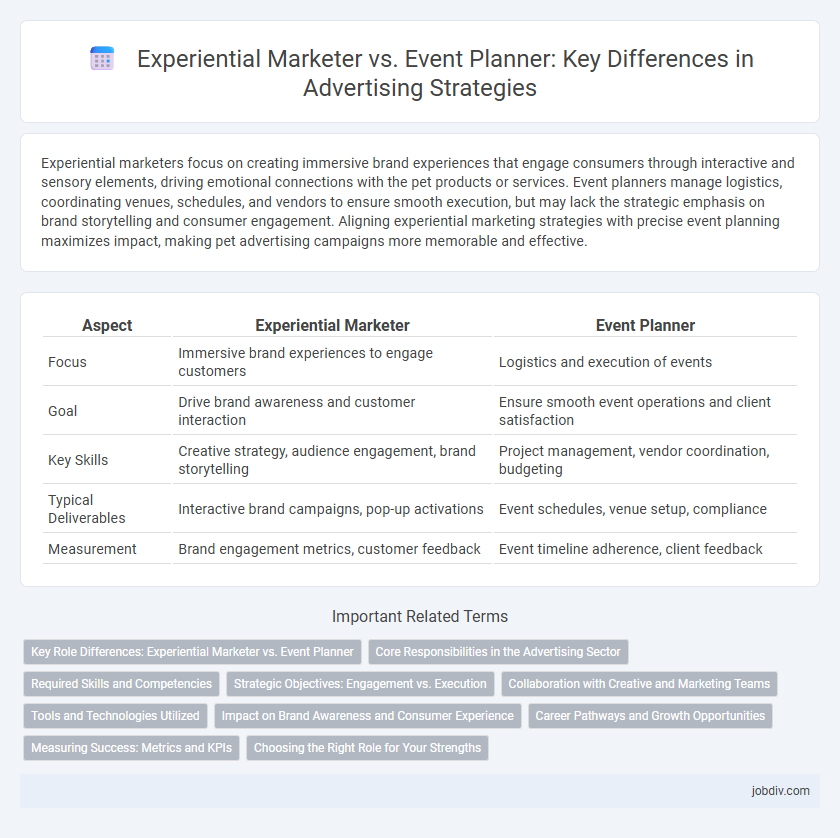Experiential marketers focus on creating immersive brand experiences that engage consumers through interactive and sensory elements, driving emotional connections with the pet products or services. Event planners manage logistics, coordinating venues, schedules, and vendors to ensure smooth execution, but may lack the strategic emphasis on brand storytelling and consumer engagement. Aligning experiential marketing strategies with precise event planning maximizes impact, making pet advertising campaigns more memorable and effective.
Table of Comparison
| Aspect | Experiential Marketer | Event Planner |
|---|---|---|
| Focus | Immersive brand experiences to engage customers | Logistics and execution of events |
| Goal | Drive brand awareness and customer interaction | Ensure smooth event operations and client satisfaction |
| Key Skills | Creative strategy, audience engagement, brand storytelling | Project management, vendor coordination, budgeting |
| Typical Deliverables | Interactive brand campaigns, pop-up activations | Event schedules, venue setup, compliance |
| Measurement | Brand engagement metrics, customer feedback | Event timeline adherence, client feedback |
Key Role Differences: Experiential Marketer vs. Event Planner
Experiential marketers design immersive brand interactions that engage consumers through multisensory experiences and strategic activation, driving emotional connections and long-term loyalty. Event planners focus on logistical coordination, managing venues, vendors, timelines, and budgets to ensure seamless execution of events. While both roles contribute to event success, experiential marketers emphasize brand storytelling and audience engagement, whereas event planners prioritize operational efficiency and detail management.
Core Responsibilities in the Advertising Sector
Experiential marketers in the advertising sector focus on creating immersive brand experiences that engage consumers through interactive campaigns and sensory elements, driving emotional connections and brand loyalty. Event planners specialize in logistics, coordination, and execution of events, ensuring seamless operational flow, vendor management, and attendee satisfaction. Both roles require collaboration, but experiential marketers prioritize strategic creative design while event planners emphasize practical event management.
Required Skills and Competencies
Experiential marketers need strong skills in consumer psychology, brand storytelling, and data-driven campaign optimization to create immersive brand experiences that drive engagement and loyalty. Event planners require expertise in logistical coordination, vendor management, and budget control to ensure seamless execution of events from inception to completion. Both roles benefit from excellent communication and problem-solving abilities, but experiential marketers emphasize creative strategy while event planners focus on operational precision.
Strategic Objectives: Engagement vs. Execution
Experiential marketers prioritize strategic objectives centered on immersive brand engagement, aiming to create meaningful, interactive experiences that foster long-term customer loyalty. Event planners focus primarily on flawless execution, managing logistics and operational details to ensure seamless event delivery. The contrast between engagement-driven strategy and execution-focused planning defines their distinct roles in advertising campaigns.
Collaboration with Creative and Marketing Teams
Experiential marketers collaborate closely with creative and marketing teams to design immersive brand experiences that foster emotional connections and drive consumer engagement. Event planners coordinate logistics by aligning vendor relationships and timelines, ensuring smooth execution of marketing campaigns without compromising creative vision. Both roles require synchronized efforts to translate strategic objectives into memorable, impactful events that maximize brand visibility and ROI.
Tools and Technologies Utilized
Experiential marketers leverage advanced tools such as VR/AR platforms, data analytics software, and social media integration technologies to create immersive brand experiences that engage consumers on multiple sensory levels. Event planners primarily utilize project management software, registration platforms, and logistical tracking tools to ensure seamless event execution and attendee management. Both roles increasingly adopt AI-driven insights and mobile event apps to optimize engagement and operational efficiency.
Impact on Brand Awareness and Consumer Experience
Experiential marketers design immersive brand interactions that deepen consumer engagement and boost brand recall through multi-sensory experiences. Event planners coordinate logistical execution ensuring seamless event flow but traditionally focus less on strategic brand messaging and emotional connection. The synergistic use of experiential marketing strategies over conventional event planning significantly enhances brand awareness by fostering memorable consumer experiences that translate into increased loyalty and advocacy.
Career Pathways and Growth Opportunities
Experiential marketers specialize in creating immersive brand experiences that drive consumer engagement and loyalty, leveraging skills in strategic campaign design, consumer psychology, and data analytics for measurable impact. Event planners focus on the logistical coordination of events, honing expertise in project management, vendor relations, and budget administration, often progressing into senior operational roles or specialized event consulting. Career growth for experiential marketers often leads to leadership positions in marketing strategy or brand management, while event planners expand into corporate event director roles or entrepreneurial ventures within the event industry.
Measuring Success: Metrics and KPIs
Experiential marketers prioritize metrics such as brand engagement, consumer sentiment, and long-term brand recall to measure campaign success, emphasizing emotional connections and customer experience. Event planners focus on operational KPIs like attendance rates, budget adherence, and logistical efficiency to evaluate event execution and immediate outcomes. Both roles rely on data-driven insights, but experiential marketers leverage qualitative feedback and social media analytics, while event planners emphasize quantitative event performance indicators.
Choosing the Right Role for Your Strengths
Experiential marketers excel in creating immersive brand experiences that drive customer engagement and emotional connection, leveraging strategic storytelling and data analytics to measure impact. Event planners specialize in coordinating logistics, vendor management, and seamless execution of events, ensuring operational efficiency and attendee satisfaction. Selecting the right role depends on your strengths: if you thrive in creative strategy and consumer interaction, experiential marketing suits you; if you excel in organization, time management, and detail orientation, event planning is ideal.
Experiential Marketer vs Event Planner Infographic

 jobdiv.com
jobdiv.com